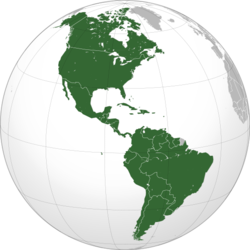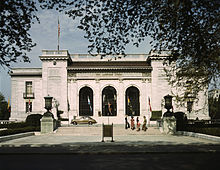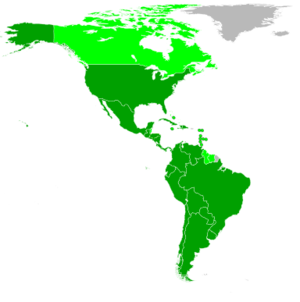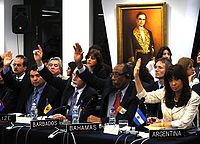- Organization of American States
-
Organization of American States
-
Organisation des États
Américains (French) -
Organização dos Estados
Americanos (Portuguese) -
Organización de los Estados
Americanos (Spanish)


Motto: Democracy for peace, security, and development Headquarters Washington, D.C. Official languages Demonym American Member States  Antigua and Barbuda
Antigua and Barbuda Argentina
Argentina Bahamas
Bahamas Barbados
Barbados Belize
Belize Bolivia
Bolivia Brazil
Brazil Canada
Canada Chile
Chile Colombia
Colombia Costa Rica
Costa Rica Cuba
Cuba Dominica
Dominica Dominican Republic
Dominican Republic Ecuador
Ecuador El Salvador
El Salvador Grenada
Grenada Guatemala
Guatemala Guyana
Guyana Haiti
Haiti Honduras
Honduras Jamaica
Jamaica Mexico
Mexico Nicaragua
Nicaragua Panama
Panama Paraguay
Paraguay Peru
Peru Saint Kitts and Nevis
Saint Kitts and Nevis Saint Lucia
Saint Lucia Saint Vincent and the Grenadines
Saint Vincent and the Grenadines Suriname
Suriname Trinidad and Tobago
Trinidad and Tobago United States
United States Uruguay
Uruguay Venezuela
Venezuela
Leaders - Secretary General José Miguel Insulza Establishment - Charter 30 April 1948 Area - Total 42,549,000 km2
16,430,000 sq miPopulation - 2008 estimate 910,720,588 - Density 21/km2
55/sq miTime zone (UTCUTC-10 to UTC) Website
http://www.oas.org/The Organization of American States (OAS, or, as it is known in the three other official languages, OEA) is a regional international organization, headquartered in Washington, D.C., United States.[1] Its members are the thirty-five independent states of the American Continent.
Contents
History
The notion of closer hemispheric union in America was first put forward by Simón Bolívar[2] who, at the 1826 Congress of Panama, proposed creating a league of American republics, with a common military, a mutual defense pact, and a supranational parliamentary assembly. This meeting was attended by representatives of Gran Colombia (comprising the modern-day nations of Colombia, Ecuador, Panama, and Venezuela), Peru, the United Provinces of Central America, and Mexico, but the grandly titled "Treaty of Union, League, and Perpetual Confederation" was ultimately ratified only by Gran Colombia. Bolívar's dream soon floundered with civil war in Gran Colombia, the disintegration of Central America, and the emergence of national rather than continental outlooks in the newly independent American republics. Bolívar's dream of American unity was meant to unify Latin American nations against imperial domination by external power.
The pursuit of regional solidarity and cooperation again came to the forefront in 1889–90, at the First International Conference of American States. Gathered together in Washington, D.C., 18 nations resolved to found the International Union of American Republics, served by a permanent secretariat called the Commercial Bureau of the American Republics (renamed the "International Commercial Bureau" at the Second International Conference in 1901–02). These two bodies, in existence as of 14 April 1890, represent the point of inception to which today's OAS and its General Secretariat trace their origins.
At the Fourth International Conference of American States (Buenos Aires, 1910), the name of the organization was changed to the "Union of American Republics" and the Bureau became the "Pan American Union". The Pan American Union (building) was constructed in 1910, on Constitution Avenue, Northwest, Washington, D.C.
In the mid-1930s, U.S. President Franklin Delano Roosevelt organized an inter-American conference in Buenos Aires. One of the items at the conference was a "League of Nations of the Americas", an idea proposed by Colombia, Guatemala, and the Dominican Republic.[3] At the subsequent Inter-American Conference for the Maintenance of Peace, 21 nations pledged to remain neutral in the event of a conflict between any two members.[4] The experience of World War II convinced hemispheric governments that unilateral action could not ensure the territorial integrity of the American nations in the event of extra-continental aggression. To meet the challenges of global conflict in the postwar world and to contain conflicts within the hemisphere, they adopted a system of collective security, the Inter-American Treaty of Reciprocal Assistance (Rio Treaty) signed in 1947 in Rio de Janeiro.
The Ninth International Conference of American States was held in Bogotá between March and May 1948 and led by United States Secretary of State George Marshall, a meeting which led to a pledge by members to fight communism in America. This was the event that saw the birth of the OAS as it stands today, with the signature by 21 American countries of the Charter of the Organization of American States on 30 April 1948 (in effect since December 1951). The meeting also adopted the American Declaration of the Rights and Duties of Man, the world's first general human rights instrument, Bogota considered the first wall of the Organization of American States.
The transition from the Pan American Union to OAS was smooth. The Director General of the former, Alberto Lleras Camargo, became the Organization's first Secretary General. The current Secretary General is former Chilean foreign minister José Miguel Insulza.
Significant milestones in the history of the OAS since the signing of the Charter have included the following:
- 1959: Inter-American Commission on Human Rights created.
- 1961: Charter of Punta del Este signed, launching the Alliance for Progress.
- 1962: OAS suspends Cuba
- 1969: American Convention on Human Rights signed (in force since 1978).
- 1970: OAS General Assembly established as the Organization's supreme decision-making body.
- 1979: Inter-American Court of Human Rights created.
- 1991: Adoption of Resolution 1080, which requires the Secretary General to convene the Permanent Council within ten days of a coup d'état in any member country.
- 1994: First Summit of the Americas (Miami), which resolved to establish a Free Trade Area of the Americas by 2005.
- 2001: Inter-American Democratic Charter adopted.
- 2009: OAS revokes 1962 suspension of Cuba
- 2009: OAS suspends Honduras due to the coup which ousted president Manuel Zelaya
- 2011: OAS lifts the suspension of Honduras with the return of Manuel Zelaya from exile.
Goals and purpose
In the words of Article 1 of the Charter, the goal of the member nations in creating the OAS was "to achieve an order of peace and justice, to promote their solidarity, to strengthen their collaboration, and to defend their sovereignty, their territorial integrity, and their independence." Article 2 then defines eight essential purposes:
- To strengthen the peace and security of the continent.
- To promote and consolidate representative democracy, with due respect for the principle of nonintervention.
- To prevent possible causes of difficulties and to ensure the pacific settlement of disputes that may arise among the member states.
- To provide for common action on the part of those states in the event of aggression.
- To seek the solution of political, judicial, and economic problems that may arise among them
- To promote, by cooperative action, their economic, social, and cultural development.
- To eradicate extreme poverty, which constitutes an obstacle to the full democratic development of the peoples of the continent.
- To achieve an effective limitation of conventional weapons that will make it possible to devote the largest amount of resources to the economic and social development of the member states.
Over the course of the 1990s, with the end of the Cold War, the return to democracy in Latin America, and the thrust toward globalization, the OAS made major efforts to reinvent itself to fit the new context. Its stated priorities now include the following:
- Strengthening democracy: Between 1962 and 2002, the Organization sent multinational observation missions to oversee free and fair elections in the member states on more than 100 occasions. The OAS also works to strengthen national and local government and electoral agencies, to promote democratic practices and values, and to help countries detect and defuse official corruption.
- Working for peace: Special OAS missions have supported peace processes in Nicaragua, Suriname, Haiti, and Guatemala. The Organization has played a leading part in the removal of landmines deployed in America and it has led negotiations to resolve the continent's remaining border disputes (Guatemala/Belize; Peru/Ecuador). Work is also underway on the construction of a common inter-American counter-terrorism front.
- Defending human rights: The agencies of the inter-American human rights system provide a venue for the denunciation and resolution of human rights violations in individual cases. They also monitor and report on the general human rights situation in the member states.
- Fostering free trade: The OAS is one of the three agencies currently engaged in drafting a treaty aiming to establish a continental free trade area from Alaska to Tierra del Fuego.
- Fighting the drugs trade: The Inter-American Drug Abuse Control Commission was established in 1986 to coordinate efforts and crossborder cooperation in this area.
- Promoting sustainable development: The goal of the OAS's Inter-American Council for Integral Development is to promote economic development and combating poverty. OAS technical cooperation programs address such areas as river basin management, the conservation of biodiversity, preservation of cultural diversity, planning for global climate change, sustainable tourism, and natural disaster mitigation.
Article 19 of the OAS Charter prohibits any State from interfering with the internal or external affairs of a member state. Article 21 prohibits any State from the military occupation—even temporarily—of a Member State's territory. The Charter subscribes to international law but goes further, saying that Charter rights depend not on power but follow from the existence of the state. The United States is signatory to the OAS Charter, meaning that the U.S. (like other Members) is legally bound by Article 19, 21, and other Charter provisions. [See Membership].
There is an increasing perception that the OAS is biased toward US concerns and influence in non-US states and countries. For example, Article 19 prohibits interfering with member states but does not prohibit interference with non-member states. This effectively forces third world nations to join the OAS by coercion and threat of US interference. There is currently an effort in South American countries including Venezuela, Bolivia, and Ecuador to create a new body that represents the South American countries in a more equitable manner and is not based in Washington, DC.
Organizational structure
The OAS is composed of a General Secretariat (GS/OAS), the Permanent Council, the Inter-American Council for Integral Development, and a number of committees, including:
- The Committee on Juridical and Political Affairs
- The Committee on Administrative and Budgetary Affairs
- The Committee on Hemispheric Security
- The Committee on Inter-American Summits Management and Civil Society Participation in OAS Activities
General Assembly
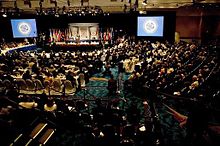 Thirty-fifth General Assembly session in Fort Lauderdale, Florida, United States of America, June 2005
Thirty-fifth General Assembly session in Fort Lauderdale, Florida, United States of America, June 2005
- Forty-first regular session: San Salvador, El Salvador, June 2011.
- Fortieth regular session: Lima, Peru, June 2010.
- Thirty-ninth regular session: San Pedro Sula, Honduras, June 2009.[5]
- Thirty-eight regular session: Medellín, Colombia, June 2008.
- Thirty-seventh regular session: Panama City, Republic of Panama, June 2007.
- Thirty-sixth regular session: Santo Domingo, Dominican Republic, June 2006.
- Thirty-fifth regular session: Fort Lauderdale, Florida, United States, June 2005.
- Thirty-fourth regular session: Quito, Ecuador, June 2004.
- Thirty-third regular session: Santiago, Chile, June 2003.
- Thirty-second regular session: Bridgetown, Barbados, June 2002.
- Thirty-first regular session: San José, Costa Rica, June 2001.
- Thirtieth regular session: Windsor, Canada, June 2000.
- Twenty-ninth regular session: Guatemala City, Guatemala, June 1999.
- Twenty-eight regular session: Caracas, Venezuela, June 1998.
- Twenty-seventh regular session: Lima, Peru, June 1997.
- Twenty-sixth regular session: Panama City, Republic of Panama, June 1996.
- Twenty-fifth regular session: Montrouis, Haiti, June 1995.
- Twenty-fourth regular session: Belém do Pará, Brazil, June 1994.
- Twenty-third regular session: Managua, Nicaragua, June 1993.
- Twenty-second regular session: Nassau, The Bahamas, May 1992.
- Twenty-first regular session: Santiago, Chile, June 1991.
- Twentieth regular session: Asunción, Paraguay, June 1990.
- Nineteenth regular session: Washington, D.C., United States, November 1989.
- Eighteenth regular session: San Salvador, El Salvador, November 1988.
- Seventeenth regular session: Washington, D.C., United States, November 1987.
- Sixteenth regular session: Guatemala City, Guatemala, November 1986.
- Fifteenth regular session: Cartagena de Indias, Colombia, December 1985.
- Fourteenth regular session: Brasília, Brazil, November 1984.
- Thirteenth regular session: Washington, D.C., United States, November 1983.
- Twelfth regular session: Washington, D.C., United States, November 1982.
- Eleventh regular session: Castries, Saint Lucia, December 1981.
- Tenth regular session: Washington, D.C., United States, November 1980.
- Ninth regular session: La Paz, Bolivia, October 1979.
- Eighth regular session: Washington, D.C., United States, June/July 1978.
- Seventh regular session: St. George's, Grenada, June 1977.
- Sixth regular session: Santiago, Chile, June 1976.
- Fifth regular session: Washington, D.C., United States, May 1975.
- Fourth regular session: Atlanta, United States, April/May 1974.
- Third regular session: Washington, D.C., United States, April 1973.
- Second regular session: Washington, D.C., United States, April 1972.
- First regular session: San José, Costa Rica, April 1971.
Membership and adhesions
All 35 independent nations of America are members of the OAS. Upon foundation on 5 May 1948 there were 21 members:
The later expansion of the OAS included the newly independent nations of the Caribbean (most of whom gained independence only after World War II) and Canada. Members with later admission dates (sorted chronologically):
 Barbados (member since 1967)
Barbados (member since 1967) Trinidad and Tobago (1967)
Trinidad and Tobago (1967) Jamaica (1969)
Jamaica (1969) Grenada (1975)
Grenada (1975) Suriname (1977)
Suriname (1977) Dominica (1979)
Dominica (1979) Saint Lucia (1979)
Saint Lucia (1979) Antigua and Barbuda (1981)
Antigua and Barbuda (1981) Saint Vincent and the Grenadines (1981)
Saint Vincent and the Grenadines (1981) Bahamas (1982)
Bahamas (1982) Saint Kitts and Nevis (1984)
Saint Kitts and Nevis (1984) Canada (1990)
Canada (1990) Belize (1991)
Belize (1991) Guyana (1991)
Guyana (1991)
Canada and the OAS
Although Canada obtained a degree of independence in its foreign policy from the United Kingdom in 1931, it chose not to join the OAS when it was first formed, despite its close relations with the United States. Canada became a Permanent Observer in the OAS on 2 February 1972. Canada signed the Charter of the Organization of American States on 13 November 1989, and this decision was ratified on 8 January 1990.
In 2004–2005, Canada was the second largest contributor to the OAS, with an annual assessed contribution representing 12.36% of the OAS Regular Budget (US$9.2 million) and an additional C$9 million in voluntary contributions to specific projects.[6][7] Shortly after joining as a full member, Canada was instrumental in the creation of the Unit for the Promotion of Democracy, which provides support for the strengthening and consolidation of democratic processes and institutions in OAS member states.[8]
Status of Cuba
The current government of Cuba was excluded from participation in the Organization under a decision adopted by the Eighth Meeting of Consultation in Punta del Este, Uruguay, on 31 January 1962. The vote was passed by 14 in favor, with one against (Cuba) and six abstentions (Argentina, Bolivia, Brazil, Chile, Ecuador, and Mexico). The operative part of the resolution reads as follows:
- That adherence by any member of the Organization of American States to Marxism-Leninism is incompatible with the inter-American system and the alignment of such a government with the communist bloc breaks the unity and solidarity of the continent.
- That the present Government of Cuba, which has officially identified itself as a Marxist-Leninist government, was incompatible with the principles and objectives of the inter-American system.
- That this incompatibility excluded the present Government of Cuba from participation in the inter-American system.[9]
This meant that the Cuban nation was still technically a member state, but that the current government was denied the right of representation and attendance at meetings and of participation in activities. The OAS's position was that although Cuba's participation was suspended, its obligations under the Charter, the American Declaration of the Rights and Duties of Man, etc. still hold: for instance, the Inter-American Commission on Human Rights continued to publish reports on Cuba's human rights situation and to hear individual cases involving Cuban nationals. However, this stance was occasionally questioned by other individual member states.
Cuba's position was stated in an official note sent to the Organization "merely as a courtesy" by Minister of Foreign Affairs Dr. Raúl Roa on 4 November 1964: "Cuba was arbitrarily excluded... The Organization of American States has no juridical, factual, or moral jurisdiction, nor competence, over a state which it has illegally deprived of its rights."[10]
The reincorporation of Cuba as an active member regularly arose as a topic within the inter-American system (e.g., it was intimated by the outgoing ambassador of Mexico in 1998)[11] but most observers did not see it as a serious possibility while the present government remained in power. Since 1960, the Cuban administration had repeatedly characterized the OAS as the "Ministry of Colonies" of the United States of America.[12][13] On 6 May 2005, president Fidel Castro reiterated that the island nation would not "be part of a disgraceful institution that has only humiliated the honor of Latin American nations".[14] After Fidel Castro's recent retirement and the ascent of his brother Raúl to power, this official position was reasserted. Venezuelan President Hugo Chávez promised to veto any final declaration of the 2009 Summit of the Americas due to Cuba's exclusion.[15]
On 17 April 2009, after a trading of warm words between the administrations of US President Barack Obama and Cuban leader Raúl Castro, OAS Secretary General José Miguel Insulza said he would ask the 2009 General Assembly to annul the 1962 resolution excluding Cuba.[16]
On 3 June 2009, foreign ministers assembled in San Pedro Sula, Honduras, for the OAS's 39th General Assembly, passed a vote to lift Cuba's suspension from the OAS. The United States had been pressuring the OAS for weeks to condition Cuba's readmission to the continental group on democratic principles and commitment to human rights. Ecuador's Foreign Minister Fander Falconí said there will be no such conditions. "This is a new proposal, it has no conditions – of any kind," Falconí said. "That suspension was made in the Cold War, in the language of the Cold War. What we have done here is fix a historic error."[17] At the end of the General Assembly the suspension was lifted but in order to readmit Cuba to the Organization, this state has to comply with all the treaties signed by the Member States including the Inter-American Democratic Charter of 2001.[18]
Suspension of Honduras
Honduras was suspended unanimously at midnight of 5 July 2009, following the 28 June expulsion of President Manuel Zelaya.[19] The de facto government had already announced it was leaving the OAS hours earlier; however, this was not taken into account by the OAS, which does not recognize that government as legitimate.[20] An extraordinary meeting had been conducted by the OAS in Washington, D.C., with Zelaya in attendance.[19][21][22] The suspension of Honduras was approved unanimously with 33 votes—Honduras did not vote.[19][22] This was the first suspension carried out by the OAS since Cuba's in 1962.[19][22]Honduras was finally re-admitted to the organization on 1 June 2011 with 32 votes in favor, with Venezuela having some reservations, and only 1 against by Ecuador.[23]
Observer countries
As of May 2011, there are 66 permanent observer countries, including the European Union.[24]
Official languages
The Organization's official languages are Spanish, English, Portuguese, and French, the national languages of the majority of its member nations. The Charter, the basic instrument governing OAS, makes no reference to the use of official languages. These references are to be found in the Rules of Procedure governing the various OAS bodies. Article 51 of the Rules of Procedure of the General Assembly,[25] the supreme body of the OAS, which meets once a year, states that English, French, Portuguese and Spanish are the four official languages. Article 28 stipulates that a Style Committee shall be set up with representatives of the four official languages to review the General Assembly resolutions and declarations. Article 53 states that proposals shall be presented in the four official languages. The Rules of Procedure and Statutes of other bodies, such as the Inter-American Council for Integral Development (CIDI), the Permanent Executive Committee of the Inter-American Council for Integral Development (CEPCIDI), the Inter-American Commission of Women (CIM), the Inter-American Drug Abuse Control Commission (CICAD), the Inter-American Commission on Human Rights (IACHR) and the Inter-American Juridical Committee (CJI), technical bodies of the OAS, also mention the four official languages in which their meetings are to be conducted. Policy is therefore dictated through these instruments that require use of the four official languages at meetings.[26]
Although a number of other languages have official status in one or more member states of OAS (Dutch in Suriname; Haitian Creole in Haiti; Quechua and Aymara in Peru, Ecuador and Bolivia; Guarani in Paraguay), they are not official languages of the Organization.
See also
- Regional integration
- Organization of Ibero-American States
- Union of South American Nations
- Rio Group
- Statues of the Liberators
- Continental organizations
References
- ^ Coordinates of OAS headquarters: 38°53′34″N 77°02′25″W / 38.8929138°N 77.0403734°WCoordinates: 38°53′34″N 77°02′25″W / 38.8929138°N 77.0403734°W
- ^ "Panama: A Country Study". Washington: GPO for the Library of Congress, 1987. http://countrystudies.us/panama/4.htm.
- ^ Special to the New York Times. "League of Nations in Americas urged by 3 Latin states", The New York Times. April 13, 1936. p. 1.
- ^ "Americas adopt neutrality pact", The New York Times. December 20, 1936.
- ^ Palencia, Gustavo (2009-05-28). "Big quake off Honduras kills 6, crumbles houses". Reuters. http://www.reuters.com/article/topNews/idUSTRE54R1ON20090529?feedType=RSS&feedName=topNews. Retrieved 2009-05-30. The 39th General Assembly of the Organization of American States OAS will be held the week following a 7.3 Mw 2009 Honduras earthquake
- ^ Canada and the Organization of American States, Foreign Affairs and International Trade Canada (DFAIT), 2005.
- ^ Canada and the Organization of American States by Dr. Ludwil J. Kos-Rabcewicz-Zubkowski, Air University Review, September–October 1967.
- ^ Canada and the OAS: A Vigorous Partnership, Canada World View, Issue 8, Summer 2000.
- ^ "Six Report on the Situation of Political Prisoners in Cuba". Inter-American Commission on Human Rights. Organization of American States. 1979-12-14. http://www.cidh.oas.org/countryrep/Cuba79eng/intro.htm.
- ^ "The Situation of Human Rights in Cuba: Seventh Report". Inter-American Commission on Human Rights. Organization of American States. 1983-10-04. http://www.cidh.oas.org/countryrep/Cuba83eng/intro.htm.
- ^ "Mexico Calls for Cuba's Reinstatement into the OAS" (Press release). Organization of American States. 1998-02-04. http://www.oas.org/OASpage/press2002/en/Press98/020498ce.htm. Organization of American States.
- ^ "The Testing of the OAS". Time. 1960-08-22. http://www.time.com/time/magazine/article/0,9171,869814,00.html.
- ^ Solis, Marta (1972-04-26). "Castro admits problems in education". Siempre (Latin American Network Information Center. University of Texas at Austin): pp. 40–41. http://lanic.utexas.edu/project/castro/db/1972/19720426.html.
- ^ "Fidel Castro: OAS Is an Instrument of the US". Prensa Latina (Havana, Cuba). 2006-05-07. http://www.plenglish.com/article.asp?ID=%7B2355B35C-068E-4DFE-879E-3E8836A38EA4%7D&language=EN.
- ^ "Chavez threatens veto over Cuba". BBC News Online. 2009-04-17. http://news.bbc.co.uk/2/hi/americas/8003507.stm. Retrieved 2009-04-17.
- ^ "U.S., Cuba trade warm words ahead of summit". msnbc.com. 2009-04-17. http://www.msnbc.msn.com/id/30261514/. Retrieved 2009-04-17.
- ^ "OAS votes to lift suspension of Cuba". The Miami Herald. 2009-06-03. http://www.miamiherald.com/459/story/1079796.html. Retrieved 2009-06-03.[dead link]
- ^ http://www.oas.org/consejo/GENERAL%20ASSEMBLY/Documents/AG04688E08.doc
- ^ a b c d "Americas group suspends Honduras". BBC. 2009-07-05. http://news.bbc.co.uk/2/hi/americas/8134699.stm. Retrieved 2009-07-05.
- ^ "Honduras leaders pull out of OAS". RTÉ. 2009-07-04. http://www.rte.ie/news/2009/0704/honduras.html. Retrieved 2009-07-05.
- ^ "OAS expels Honduras' membership over coup". China Daily. 2009-07-05. http://www.chinadaily.com.cn/world/2009-07/05/content_8379729.htm. Retrieved 2009-07-05.
- ^ a b c "Organisation of American States suspends Honduras over coup". The Times. 2009-07-05. http://www.timesonline.co.uk/tol/news/world/us_and_americas/article6640179.ece. Retrieved 2009-07-05.
- ^ http://www.oas.org/en/media_center/press_release.asp?sCodigo=E-698/11
- ^ Macedonia Becomes 66th OAS Permanent Observer http://www.oas.org/en/media_center/press_release.asp?sCodigo=E-675/11
- ^ General Assembly of the OAS, Amendments to the Rules of Procedure of the General Assembly, 5 June 2000
- ^ Marguerite Groves (Coordinator, Division of Language Services, OAS), Information on the use of language at the OAS: multilingualism, Inter-American Languages Management Seminar, Conseil supérieur de la langue française (Quebec), Quebec City, 20 to 22 August 2002
External links
- OAS official site
- Door Opens to OAS for Cuba By Thelma Mejia, Havana Times, 4 June 2009
- OAS Special Rapporteur on Freedom of Expression
- OAS Executive Secretariat for Integral Development (SEDI)
- OAS Foreign Trade Information System – SICE
- Outdoor sculpture at the OAS headquarters building
- Educational Portal of the Americas
- OAS Lifts Ban On Cuba After 47 Years by Portia Siegelbaum, CBS News, 3 June 2009
- Cuba's Fidel Castro Calls OAS a "U.S. Trojan Horse" by Xinhua, 4 June 2009
- The Organization of American States in Haiti: Election Monitoring or Political Intervention?, from the Center for Economic and Policy Research, October 2011
Regional integration in Latin America and the Caribbean Thought and history Spanish American wars of independence · Latin American wars of independence · Latin American integration · Pan-Americanism · Simón Bolívar · José de San MartínOrganizations Amazon Cooperation Treaty Organization · Andean Community of Nations · Association of Caribbean States · Bolivarian Alliance for the Americas · Caribbean Community · Central American Integration System · Latin American Integration Association · Latin American Economic System · Mercosur · Organization of American States · Organisation of Eastern Caribbean States · Organization of Ibero-American States · Petrocaribe · Rio Group · Union of South American Nations · Community of Latin American and Caribbean StatesProjects Andean passport · CARICOM Single Market and Economy · CARICOM passport · CARIPASS · Central America-4 Border Control Agreement
Central America-4 passport · Eastern Caribbean Currency Union · Initiative for Infrastructure Integration of South America · Interoceanic Highway · SUCRE (currency)Institutions FTAs Bodies African Union · Arab League · ASEAN · Association of Caribbean States · Caribbean Community · Central American Integration System · Commonwealth of Independent States · Council of Europe · Economic Cooperation Organization · European Union · Latin American Parliament · Melanesian Spearhead Group · Mercosur · NATO · Organization of American States · Pacific Islands Forum · Polynesian Leaders Group · Shanghai Cooperation Organisation · South Asian Association for Regional Cooperation · Union of South American Nations · Turkic CouncilTopics Categories:- Organization of American States
- International diplomatic organizations
- International organizations of the Americas
- International political organizations
- National Register of Historic Places in Washington, D.C.
- United States–South American relations
- Organizations established in 1948
- United Nations General Assembly observers
-
Wikimedia Foundation. 2010.

